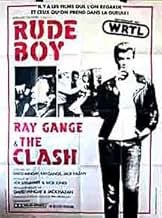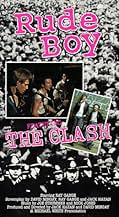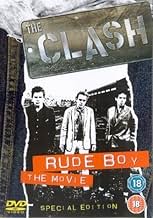IMDb RATING
6.4/10
1.7K
YOUR RATING
A young British punk and roadie for The Clash navigates life in socially torn 1970s England.A young British punk and roadie for The Clash navigates life in socially torn 1970s England.A young British punk and roadie for The Clash navigates life in socially torn 1970s England.
- Awards
- 1 win & 1 nomination
- Directors
- Writers
- All cast & crew
- Production, box office & more at IMDbPro
Storyline
Did you know
- TriviaAs an intro Before playing 'White Riot' as bouncers & the audience were fighting at the Glasgow Apollo Joe Strummer says "Simmer down ..Control your temper" . This is the first line from Bob Marley & the Wailers 1963 Jamaican hit single 'Simmer Down'
- GoofsWhen reporting the outcome of the trial, David Mellor is described as "David Mellor QC". Mellor was not made a Queen's Counsel until 1987.
- Quotes
Lead guitarist: You know what I think, don't you? I've been watching you.
Rude Boy: Yeah, I noticed. Quite a lot.
Lead guitarist: I been watching you.
Rude Boy: I'll keep it in mind.
Lead guitarist: Do.
- Alternate versionsReleased at 133 minutes in Europe; US prints run 120 minutes.
- ConnectionsFeatured in White Riot (2019)
- SoundtracksPolice And Thieves
Written by Junior Murvin and Lee 'Scratch' Perry
Sung by Junior Murvin
Island Records
Featured review
...despite copying the musicians in the studio trope, the porn-shop as symbol of capitalism and the black/white subplot. However "Rude Boy" perhaps deserves a little more attention than it seems to have received.
As a 'proper movie' it's kind of a washout. Aiming for an improvised cinema-verite feel, it's hamstrung by a fatal lack of tension, having apparently been assembled by people with little grasp of editing, narrative or any kind of cinematic style. Despite this, the concert footage of The Clash is indispensable to anyone with an interest in the era, and shows why they were one of the all-time great rock and roll bands. We have very few 70's punk bands recorded properly on film as opposed to video and the difference in quality is striking. Also, Joe Strummer's death is still quite recent as I write and seeing him here in his prime is poignant in the extreme.
In general there are very few film documents of punk. We have Jarman's "Jubilee" which was more of a neo-Elizabethan fantasia, "The Great Rock and Roll Swindle" with its McClarenite rewriting of history and come-lately nonsense like "Breaking Glass". "Rude Boy" at least doesn't fall into any narrative clichés (if only by barely having a plot) and by its very lack of creative flair may succeed best in giving a picture of the time. For example, unlike the myth-making of the likes of "Sid and Nancy", this shows punk gigs as they actually were - largely populated by lads with feather-cuts and tank tops.
By concentrating on hanger-on Gange instead of the band itself, the filmmakers turn the story into one of the relationship between the band and its fan-base - pointed up by having Strummer sing "All The Young Punks" right through in the studio without the backing track to distract us from the lyric.
The commentator who said this did not give a true picture of the politics of the time is surely wrong. I was there and it seems pretty accurate to me. We see the resurgent National Front, the Anti-Nazi League, the bullishness and racism of the police at the time (which would shortly lead to the Brixton riots) and the rise of Thatcherism out of the bankrupt Butskellite consensus. Ray Gange's character in the film seems intended to represent the British white working class at the time - confused, politically disengaged and borderline racist, the attitudes which led to the Thatcher victory we see at the end of the film. The left, variously represented by the SWP (bureaucratic) and Strummer (by turns tokenistic and diffident) fails to capture Gange's imagination and it is the right who seize on the desire for change and turn it to their own advantage.
Rude Boy is a strange curate's egg, then. There may have been a really good film struggling to get out of this morass, but we'll never know. The special edition DVD has a "Just Play the Clash" function which lets you view only the concert footage and I suspect this will get a lot of use.
Rating? 3/10 for the story, 10/10 for the music.
As a 'proper movie' it's kind of a washout. Aiming for an improvised cinema-verite feel, it's hamstrung by a fatal lack of tension, having apparently been assembled by people with little grasp of editing, narrative or any kind of cinematic style. Despite this, the concert footage of The Clash is indispensable to anyone with an interest in the era, and shows why they were one of the all-time great rock and roll bands. We have very few 70's punk bands recorded properly on film as opposed to video and the difference in quality is striking. Also, Joe Strummer's death is still quite recent as I write and seeing him here in his prime is poignant in the extreme.
In general there are very few film documents of punk. We have Jarman's "Jubilee" which was more of a neo-Elizabethan fantasia, "The Great Rock and Roll Swindle" with its McClarenite rewriting of history and come-lately nonsense like "Breaking Glass". "Rude Boy" at least doesn't fall into any narrative clichés (if only by barely having a plot) and by its very lack of creative flair may succeed best in giving a picture of the time. For example, unlike the myth-making of the likes of "Sid and Nancy", this shows punk gigs as they actually were - largely populated by lads with feather-cuts and tank tops.
By concentrating on hanger-on Gange instead of the band itself, the filmmakers turn the story into one of the relationship between the band and its fan-base - pointed up by having Strummer sing "All The Young Punks" right through in the studio without the backing track to distract us from the lyric.
The commentator who said this did not give a true picture of the politics of the time is surely wrong. I was there and it seems pretty accurate to me. We see the resurgent National Front, the Anti-Nazi League, the bullishness and racism of the police at the time (which would shortly lead to the Brixton riots) and the rise of Thatcherism out of the bankrupt Butskellite consensus. Ray Gange's character in the film seems intended to represent the British white working class at the time - confused, politically disengaged and borderline racist, the attitudes which led to the Thatcher victory we see at the end of the film. The left, variously represented by the SWP (bureaucratic) and Strummer (by turns tokenistic and diffident) fails to capture Gange's imagination and it is the right who seize on the desire for change and turn it to their own advantage.
Rude Boy is a strange curate's egg, then. There may have been a really good film struggling to get out of this morass, but we'll never know. The special edition DVD has a "Just Play the Clash" function which lets you view only the concert footage and I suspect this will get a lot of use.
Rating? 3/10 for the story, 10/10 for the music.
- Krustallos
- Mar 6, 2005
- Permalink
- How long is Rude Boy?Powered by Alexa
Details
- Release date
- Country of origin
- Language
- Also known as
- The Clash: Rude Boy
- Filming locations
- Camberwell Road, Southwark, London, England, UK(procession of Royal cars passes along)
- Production companies
- See more company credits at IMDbPro
Contribute to this page
Suggest an edit or add missing content


























